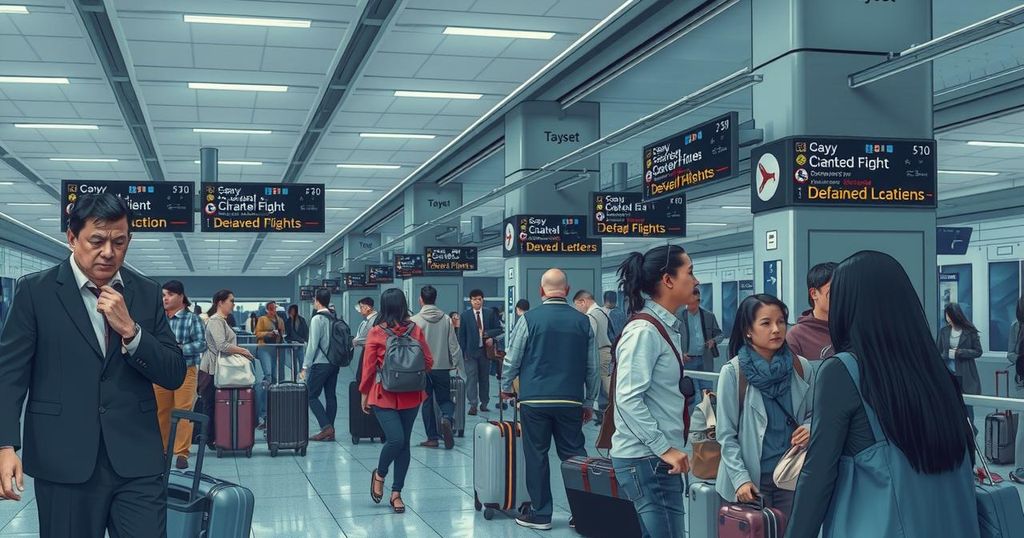President Trump Revives Travel Ban, Transforming U.S. into a Travel Minefield
President Donald Trump has reinstated the travel ban, impacting citizens from over a dozen countries including Cuba, Burma, and Iran. The ban raises tensions in the global tourism industry, prompting fears of legal challenges and diplomatic fallout. Airlines are already experiencing upheaval as travelers scramble to adjust plans. Students and families are particularly affected, highlighting the human cost behind policy changes.
In a striking turn of events, President Donald Trump has revived the controversial travel ban, leaving America once again as a virtual minefield for international travelers. This time, the restrictions are not only broader but also deeper, encompassing countries like Cuba, Burma, and Iran among others. The implications of this revival are multi-faceted, dramatically impacting the international mobility landscape, with airlines and immigration systems already on high alert. For many affected individuals, especially students and business travelers, the sudden reintroduction of such restrictions raises serious concerns about their travel plans and future interactions with the United States.
This sweeping travel ban, set to take effect at the early hour of 12:01 a.m. on Monday, prohibits entry for travelers from 13 specific countries, while imposing additional restrictions on eight more. The decision has stirred chaos within the global tourism and airline sectors—many were taken off guard by this quick reversal of fortune. Countries that are notably affected include Afghanistan, Syria, and Venezuela. As the ban escalates tensions, there is growing uncertainty around what the new guidelines will mean for visa applications and potential travel cancellations.
Airlines, in particular, are bracing for a significant backlash. The scenario presents an echo of confusion reminiscent of the 2017 iteration of the ban, reminding industry insiders of the chaos experienced then. Carriers are inundated with unexpected rebooking requests, and immigration officials are racing to adapt to new protocols. Panic may ensue at airports, with passengers facing unexpected hurdles on travel day.
The travel sector is bracing for a considerable downturn. Particularly, niche markets like cultural tours and academic exchanges—which form vital economic links with several of the affected countries—will likely be hit hard. Boutique agencies in key cities depend on these segments to maintain viability. Companies involved in international travel face a new reality, where canceled flights and tightened restrictions may yield less revenue and increased competition among domestic travelers.
Moreover, these repercussions extend beyond simple economics; there’s a heightened risk of deteriorating diplomatic relations. Nations might respond to the American ban with their own travel restrictions or unfavorable diplomatic gestures. This could complicate ongoing dialogues concerning international security and trade. As tensions intensify, the potential for long-term reputational damage to the United States in the tourism sphere is a real concern.
Legal challenges are looming on the horizon as civil rights groups prepare to contest this reinstatement of a travel ban. Drawing from the lessons of previous judicial battles surrounding similar executive actions, there exists a high probability that the courts will once again become arenas for contesting the legalities of such broad immigration policies. The current polarization in politics could further complicate these challenges, making outcomes increasingly unpredictable.
Simultaneously, travel advisors and online booking platforms are scrambling to catch up with the rapid changes in regulations. It’s become evident that they must incorporate considerations of geopolitics into their operational frameworks. The emotional fallout for travelers is immense. Families are separated, students face uncertain academic futures, and business deals hang in the balance, creating a complex web of frustration and helplessness for those trying to navigate through these new restrictions.
In conclusion, the reinstatement of the travel ban marks a significant turning point in U.S. immigration policy that echoes broader global tensions. The implications reach far and wide—impacting air travel, tourism, and international relations—and leaves many questioning the future of cross-border interactions. The stakes are heightened, and as the consequences unfold, the travel industry finds itself at a crossroads, tasked with adapting to this new and challenging environment while advocating for a more open and inclusive world.
In summary, President Trump’s renewed travel ban creates a complex web of challenges for international travelers, airlines, and the tourism industry. With broad implications for diplomatic relations and potential legal battles looming, the next steps are uncertain. The emotional impact on students and families cannot be overlooked, as they face disruptions to their lives and plans. The future of travel will undoubtedly be influenced by how stakeholders respond to this significant policy shift.
Original Source: www.travelandtourworld.com




Post Comment